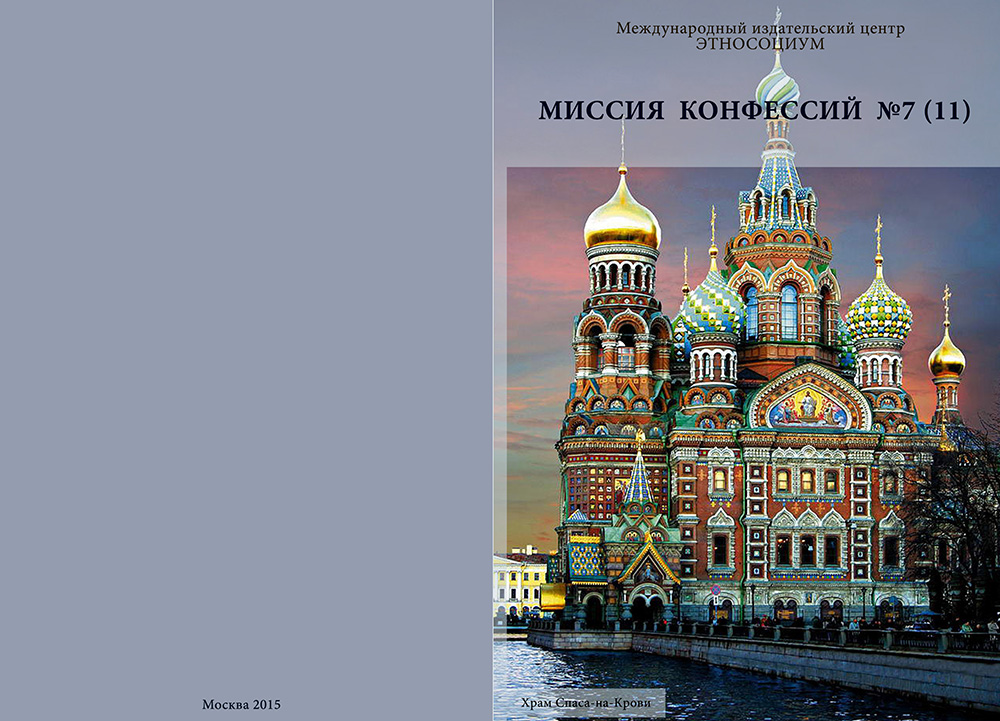Content
|
PHILOSOPHY, SOCIOLOGY AND CULTURE
|
|
|
Solonin K.U., Tumanyan T.G. Philosophy and culture of the East in St. Petersburg University: tradition of learning
|
6
|
|
Zhuchkova A.V. Philosophic concepts of “freedom” and “death”
|
12
|
|
Letynovski P.V. The ambivalence and agradecia of political and legal culture of Russia in the light of contrastive and regulatory analysis
|
21
|
|
Shmidt V.V. A Message to the Man and the World about Being and its statuses, the planes of the Human and the World (déjà vu of ages and senses on the topic of Death, Judgement, Resurrection)
|
26
|
|
RELIGION: PAST AND PRESENT
|
|
|
Smirnova M.I., Staricin A.V. Religious policy of Russia in the North Caucasus
|
36
|
|
Ternovaya L.O. Patron saints of students
|
45
|
|
Crimea
|
55
|
|
Abstracts
|
57
|
|
Authors
|
60
|
Abstracts
Solonin K.U.
Tumanyan T.G.
Philosophy and culture of the East in St. Petersburg University: tradition of learning
The article covers some aspects pertaining to the history and methodological foundations of the study of the Oriental philosophy and culture in St. Petersburg State University. The article concentrates on the educational and research activities of the School of Oriental Philosophy and Culture Studies of the Institute of Philosophy, St. Petersburg State University. This institution was the first educational and research body concentrated mainly on the issues of philosophy and culture rather than languages and history.
Keywords: Department of Oriental Philosophy and Cultural Studies, education, university, culture, religion, philosophy, oriental languages.
Zhuchkova A.V.
Philosophic concepts of “freedom” and “death”
The problem of freedom is the main question in the European culture. The search for individual freedom leads to the desire of changing the environment trying to survive, and, as a consequence, to the horror of death. Having chosen this path, the European society collapsed. “Such as we are, we stink, because [we are] imbued with egoism, masochism and death. We have created a system in which life is impossible,” writes M. Houellebecq. But there is another way. We believe that freedom is not separation, but unity in peace, with the loved ones, with the nation. Russia has always adhered this way. So what are we going to choose today?
Keywords: freedom, death, Russia, unity, nation, responsibility, European civilization.
Letynovski P.V.
The ambivalence and agradecia of political and legal culture of Russia in the light of contrastive and regulatory analysis
In the article the author raises the question of statehood and the problems of constitutional transformation of the society, based on the understanding of historical identity and national consciousness of Russian citizens.
Keywords: cultural and legal heritage, national traditions, spirituality, Orthodoxy, sovereignty and national dignity.
Shmidt V.V.
A Message to the Man and the World about Being and its statuses, the planes of the Human and the World (déjà vu of ages and senses on the topic of Death, Judgement, Resurrection)
In the article, the author describes a model, in which a religious complex appears in the status not only of the subject, but also of such categories as “Being” and “I”. With this purpose the author uses a philosophical and theological approach, the so-called “Concept of the constructing model of Genesis”. The place and essence of such notions as “religious factor” and “the sacral” are pondered on.
Keywords: philosophy of religion, theology, approach, model, teleology, religious complex, religious factor, the sacral.
Smirnova M.I.
Staricin A.V.
Religious policy of Russia in the North Caucasus
Chronologically, the article covers the pre-Soviet period of Russian history. The issue of religious policy is most relevant in the context of the mechanisms of formation of the Russian territorial and civilizational space, as well as contemporary issues of security of Russia and its territorial integrity. No one disputes the modern religious revival in the North Caucasus, as well, in the whole south of Russia and in its other regions. Religion also includes a dividing potential. This is particularly evident today in the «hot spots» of the planet. There are not any extreme hazards in the North Caucasus, but there is a tendency to contradictions. Russia has accumulated centuries-old experience of coexistence of religions and cultures. It is necessary to communicate and study it in order not to be defenseless against attempts to destabilize the situation.
Keywords: religious politics, religion, the North Caucasus, the pre-Soviet period, the history of religious policy.
Ternovaya L.O.
Patron saints of students
The formation of students’ fraternity was complicated in many ways. This process was reflected by the relationship between university education and religious institutions. The Church in Europe acted as a founder of the University, and as a patron of scholars. Thus, revered saints of the Church became patrons of students, and their patron saints’ days have become holidays to students. These traditions are still preserved.
Keywords: public religion, university, students, patron saint, festival.
Authors
Letynovski P.V., Doctor of Political Sciences, Professor of Smolensk State University.
Smirnova M.I., Candidate of Political Sciences, Head of the project “Culture of Peace” in Moscow.
Solonin K.U., Doctor of Philosophical Sciences, Professor of the Institute of Chinese classics, Chinese People’s University.
Staricin A.V., Candidate of Legal Sciences, Associate Professor of the Department of criminal law and procedure, Institute of Economics and law (branch) of the Educational institution of trade unions of higher education “Academy of Labour and Social Relations” in Sevastopol.
Shmidt V.V., Doctor of Philosophical Sciences, State Advisor of the 1st class, Professor of the Department of National and Federative Relations of The Russian Presidential Academy of National Economy and Public Administration.
Ternovaya L.O., Doctor of Historical Sciences, Professor (MADI, Moscow Automobile and Road Construction University).
Tumanyan T.G., Doctor of Philosophical Sciences, Professor, Head of the Department of Oriental Philosophy and Cultural Studies.
Zhuchkova A.V., Candidate of Philological Sciences, Assistant Professor, Department of Russian and Foreign Literature, Peoples’ Friendship University of Russia, Moscow.





